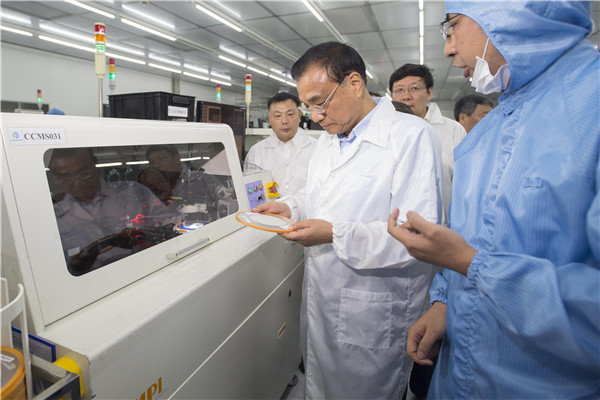
Premier Li Keqiang visits Lattice Power, a technology company based in Nanchang, Jiangxi province on Aug 23, 2016. The company’s silicon-based LED technology broke technological monopoly of the United States and Japan and has been put into mass production.
China plans to enhance the quality and standards for consumer goods through more market-oriented measures and adopting wider range of global standards in the next five years.
The step is part of country’s supply-side structural reform and boosting domestic consumption.
A new guideline on improving consumer goods standards and quality (2016-2020), initiated by the General Administration of Quality Supervision, Inspection and Quarantine (AQSIQ), was approved during the State Council’s executive meeting on Aug 24, chaired by Premier Li Keqiang.
The latest rules are part of the country’s ongoing economic transition from an investment driven economy to one focused on consumption. Domestic consumption contributed 73.4 percent to China’s GDP growth in the first half of 2016.
“Government departments should enhance coordination, while enterprises need to have stronger emphasis on quality, branding, R&D and marketing. They also need to create mass awareness on branding,” Premier Li said. “It is important that the quality of consumer goods made in China can withstand the test of the market.”
Further steps will be taken on upgrading consumer goods standards, improving quality, enterprise competence, and developing more domestic brands with global appeal.
According to the new guideline, more than 95 percent of consumer goods in major sectors will meet international standards by 2020.
There are issues yet to be addressed though. For example, the current benchmark for consumer goods still falls short of what domestic consumers want. This shows that Chinese brands still have a lot of work to do to build up their competitiveness.
During the meeting, Premier Li highlighted the importance of product safety.
“Product safety comes first and foremost for improving consumer goods quality and standards,” Premier Li stressed. “We should not turn product safety a matter of concern for consumers. The government should also reform supervisory methods.”
Major efforts in the coming five years will include upgrading the present standard of consumer goods, improving quality of consumer goods, building world-class brands and optimizing market environment. Apart from these steps, the government will also provide more financial and regulatory support to develop the sector.
Efforts in branding will be enhanced with stronger protection and regulation of intellectual property rights, especially patents and trademarks. Counterfeit and low quality goods will be primary targets for law enforcement. And a better inspection system, including random checks, will be established to monitor manufactures.
The Premier pointed out that improvement in consumer goods will go hand in hand with the development of equipment manufacturing industry.
“By improving consumer goods sector, we will force the upgrading of equipment manufacturing,” Premier Li said. “The manufacturing industry is the cornerstone for the country’s entire industry.”
Premier Li said companies need to take more steps to provide workers with tailored skills through coordination with vocational institutions.
“We need to train more highly skilled workers and foster a culture of craftsmanship,” the Premier added.
Chinese consumption overseas reached 1.5 trillion yuan ($226.15 billion) in 2015, of which about half was spent on shopping, according to the Ministry of Commerce.
